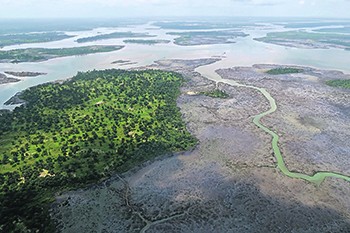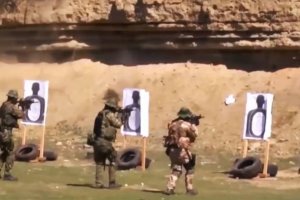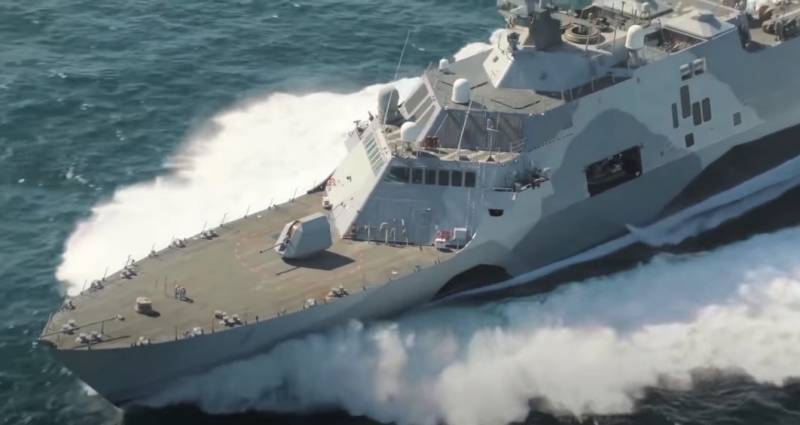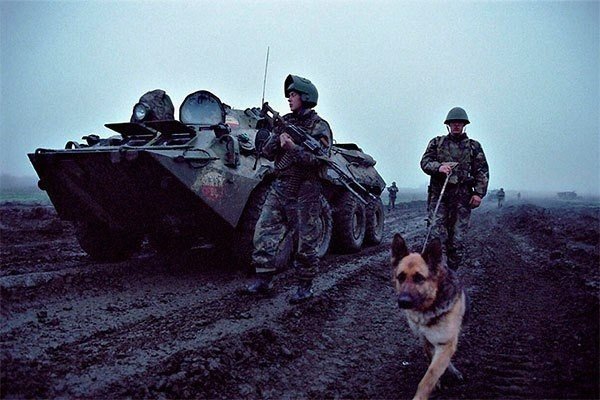
The Niger Delta region has no direct benefit from its oil production. photo: Reuters
When an oil pipeline blows up in the Niger Delta, the immediate rise in hydrocarbon prices around the world is a timely reminder of the importance of this volatile region. In Nigeria and neighboring countries of West Africa, a fierce struggle of internal and external forces for power continues, territories and natural resources, the main of which is oil. In recent years, radical Islamist terrorist organizations such as "Boko Haram" have been added to the interethnic and interethnic military-political groups in the region..
Conflicts in southern Nigeria
Nigeria, which today lives about 200 million people, represented by over 250 indigenous peoples and tribes. The three largest ethnic groups in the country are Hausa, Yoruba and Igbo. Together with three other groups - fulbe, ibibio and kanuri - they make up 70% population. The western side of the Niger River is predominantly inhabited by the Yoruba people, eastern - traditional territory of the Igbo tribe. The oil-rich Niger Delta is the center of all black gold mining in Nigeria and gives the country 80% revenues to the state budget. The Niger Delta includes 9 states: Cross River, Aqua-Ibom, River, Bayelsa, Delta, Ondo, Abia, Imo and Edo, in which more than 31 million people.
From the discovery of the oil fields until today, the Niger Delta region has been deprived of direct benefits from this resource., which is the main source of funding for the federal and state budgets of the rest of the country.
Nigeria is the largest oil producer and exporter in Africa and plays an important role in the global oil market. For decades, Western oil companies (Chevron, Shell, Exxonmobil) mercilessly exploit the area and use standards for oil production, diametrically opposite to those adopted in their countries, as a result of which rivers and other bodies of water are polluted, traditional opportunities are destroyed, related to fishing and agriculture.
Nigerians expected, that oil companies, deriving huge profits from oil production and refining, will invest in the development of infrastructure and social sphere of the country and the region. They tried to draw the attention of oil owners to the problems of ecology and poverty of the local population., but, without getting any reciprocal steps from foreign company owners, were forced to start a guerrilla armed struggle with them. Oil Company Employees and Oil Infrastructure Potential Targets for Rebel Attacks. Oil pipelines explode, pirates attacking tankers, oil is pumped to other ships, Nigeria comes out on top in the world for the smuggling of this strategic raw material. The rebels do not hesitate to demand ransoms for the crews of ships and the return of ships to their owners.
FROM 2009 by 2015 the situation in the Niger Delta was characterized by a temporary calm. President of Nigeria (2007–2010) Umaru Yar-Adua announced a broad amnesty for members of illegal armed groups and tried to solve at least some of the most acute economic and social problems of the region.
His successor is Goodluck Jonathan (ijo), who led Nigeria with 2010 by 2015 year, continued this course in domestic politics and economics, but in 2015 year, a native of Northern Nigeria, Muhammad Bukhari, came to power (full). Compensation payments to members of armed formations were canceled, who stopped fighting and laid down their arms, punitive operations against the rebels began again, which plunged the region into another round of escalation of the armed conflict.
Military-political groups in the Niger Delta were in solidarity with the groups, pro-secession to south-east Nigeria. The purpose of these organizations is to hold a referendum on the creation of an independent state of Biafra..

king forever? West of the events 15 January Russia
Southeast Nigeria (Biafra)
As in the Middle East, When creating new states, Great Britain did not take into account the ethnic and national characteristics of tribes and territories and simply divided Nigeria on a geographical map into six geopolitical zones, six states in each. The Biafran civil war of independence that broke out in the country in 1967-1970 was the result of ethnic, cultural and economic contradictions between north and south, but was soon suppressed with the participation of Great Britain, despite the support, rendered to separatists by a number of other countries. So far, the causes of regional confrontation have not been eliminated, and the desire for self-determination over the past 20 years revived the idea of independence for Biafra.
North of Nigeria
Hausa and Fulani peoples live in the Muslim north, populating more than half of the country's territory. Yet 400 years ago, they sought to capture the trading cities of their southern neighbors. The government of Nigeria is currently at war with radical Islamist groups., who are trying to create their new caliphate, sharia-governed, there, where in the 16th century there was the Sokoto Caliphate.
The greatest threat to the central authorities is posed by the powerful terrorist group Boko Haram and the branch of the Islamic State in the Middle East.. Curious then, that the United States and its Western allies could destroy terrorist camps in northern Nigeria, how they did it in Syria and Iraq, however, for now they prefer not to do this, using the historically formed confrontation between the south and the north to their advantage.
South African private military company (PMC) STTEP c 2016 almost completely displaced Boko Haram from northwest Nigeria in three months, until the World Bank and the United States began to put pressure on African countries, who have used STTEP services. The head of this PMC Eben Barlow said: “We are under fire from the forces, secretly supporting terrorism, inciting chaos and conflict, but outwardly pretending, that they are fighting him. They mask their policies of economic sabotage and destabilization, acting to extract African raw materials for transnational corporations ". As it appears, the principle of the great powers of the times of colonialism "divide and rule" remains in service with the modern "arbiters of the destinies of mankind".
Ambazonia
Nigeria's eastern border adjoins South Cameroon, where a new war has been brewing for several months - the war of Ambazonia. The armed struggle in the southwest and northwest of Cameroon has a long history. The English-speaking territories were forcibly swallowed up by France, contrary to the binding UN resolution of 14 December 1960 year of granting independence to all colonial peoples and countries. Great Britain ceded English-speaking South Cameroon to French Cameroon's sovereignty, not the government of South Cameroon, as required by international law. Peaceful protests by South Cameroon teachers and lawyers in 2016 year were suppressed by the government of Cameroon, which led to a full-scale guerrilla war. The Ambazon War has since caused the death of more 2 thousand. human, while 530 thousand. became refugees, and most of them fled to neighboring Nigeria.
AT 2017 the United Front of the Ambazonia Consortium in South Cameroon (Southern Cameroons Ambazonia Consortium United Front, SCACUF) unilaterally declared Ambazonia independent. Ambazonia was also admitted to the International Non-Governmental Organization of Unrepresented Nations and Peoples, whose purpose is to protect the interests of nations and indigenous peoples (UNPO), do not have their own states and / or live in occupied or disputed territories. Usually, UNPO member organizations do not have international representation or are represented in some international organizations as observers. UNPO members, joining it, undertake (but not always observed in practice) adhere to the principle of non-violence in the struggle for their national interests.
Separatist Alliance
Biafra's representatives 2019 met with the separatist forces of Cameroon in Enugu State. The meeting was attended by the Prime Minister of the Biafra government in exile and some leaders of other diaspora supporters of Biafra. It was decided to form a united front of resistance to their governments. The created alliance poses a significant threat to Nigeria and Cameroon and can lead to protracted civil wars. With long historical roots, these conflicts make the separatists of Biafra and Ambazonia serious opponents of the existing states of the region. Separatist leaders have a similar ideology and ultimately the same goal.

US con Greece: US bases in the country turned into targets for Iranian missiles
The emerging alliance poses a threat to the unity and existence of both Nigeria, and Cameroon, as Boko Haram and the West African branch of the Islamic State are now constantly expanding geographically to northeastern Nigeria, ravaging the Northern Center along with the Fulani extremists.
The bulk of industrial production in Cameroon, including its only refinery, where Niger Delta oil can be refined, located in the Ambazon region. Consequently, the economic consequences of such an alliance could threaten the integrity of West African countries, the future of the economic community of West African states, overall security and stability.
Assessment of the current situation
Due to daily theft of about 200 thousand. bbl. oil Nigeria only in 2016-2017 received less than 105 billion dollars. Government of Nigeria's countermeasures against oil smuggling and piracy are ineffective due to high levels of corruption at all levels of government, including central government. This means, financing of separatist and terrorist groups controlling illegal business in the region will continue in the coming years. Without addressing root causes, causing internal and regional conflicts in Nigeria and Cameroon, overcoming the atmosphere of chaos and violence in West Africa is impossible. Until the management of the oil industry is organized taking into account the interests of the indigenous population, the main problems of a socio-economic nature will not be solved, ecology and infrastructure will not start to recover, there will be no peace in the region. The reluctance of the leaderships of Nigeria and Cameroon to clarify the essence of the conflicts and take steps towards the protesters only exacerbates the situation and creates preconditions for the growth of separatist sentiments and the intensification of the activities of radical Islamist groups..
In the absence of access to education, with a high level of unemployment, participation in protests is becoming more attractive for young people. Sometimes for young people this is the only way to improve their social status and earnings. Modern information technology (the Internet, mobile connection) are actively used by the opposition to attract young people to their ranks.
Rebel base camps are located in hard-to-reach swampy areas and mangroves, away from cities, there, where there are no roads. Nature itself provides the rebels with ideal conditions, therefore, it is extremely difficult to find them and fight them. In this area, detachments numbering from 500 to 2000 human. The rebels spend their weekdays in the jungle, and on the weekend they return to their families, to cities and towns.
Lack of a common leader among rebel groups eliminates the possibility of being killed or bribed by the government or oil companies, making it very difficult for the government to act on armed groups. But to large-scale offensive actions, the rebels of the Niger Delta, Biafra and Ambazonia are not ready yet, their main problem is obvious - the need for weapons. The rebels lack light and heavy machine guns to develop the initiative, grenade, mortars and other modern weapons.
1990s illicit arms shipments from Eastern Europe dried up. There are no new established channels for the supply of weapons, with the exception of insignificant small wholesale lots. The amnesty program also played a role here. 2009 of the year, when there was voluntary disarmament from above 20 thousand. participants in illegal armed groups. About 2700 firearms, 3,5 million units of various ammunition, 18 combat boats.
Former South African arms dealer, and later one of the leaders of the Niger Delta, organizing significant illegal arms shipments to the region, Henry Okach, He was arrested in 2010 year in Johannesburg and sentenced to life imprisonment. Besides, arrests of many international arms dealers, in recent years, also affected the shortage of weapons in the region. party of 13 containers with weapons from Iran was confiscated in 2010 year by the Nigerian authorities in the port of Lagos.
The problem of supplying rebel troops with weapons is partially solved by buying weapons from soldiers and officers of the Nigerian army, selling it from military warehouses. Besides, together with the military of some West African countries, developed logistic routes for possible illegal supply of weapons and military equipment.

20-anniversary of education reform: EGE and the epoch of silicone
Evolution of conflict
Biafra Alliance, Delta of Niger and Ambazonia Demonstrates Sophisticated Tactics, based on sudden strikes in several places simultaneously. Such "foresight" was revealed, when well-trained and trained military professionals began to function in the region, coordinating insurgents and preparing them for large-scale hostilities, teaching guerrilla warfare skills.
But without a strong ally, this, eg, like Iran, who can help the liberation movement arm itself at the federal level with the aim of full-fledged armed resistance, up to ground shelling of air targets, it will be extremely difficult to manage.
Following a targeted US air strike, which resulted in the death of a high-ranking Iranian general Qasem Suleimani, Iran has sworn an oath of tough revenge and can not only call on well-armed allies across the Middle East, but also find supporters in West Africa, where American businesses can be attacked.
And if this logical union develops, a new historical moment will be created for the deployment of intrastate confrontation and change the form of existing political, social and ethnic conflicts in West Africa. Iran's influence on the African continent will expand. All the prerequisites for the escalation of armed confrontation in the region have been created and are actively supported both within the country, and external stakeholders. The main reason for possible military action is oil and strategic sea, land and air communications.











